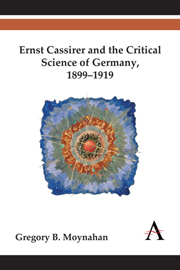Book contents
- Frontmatter
- Dedication
- Contents
- Acknowledgments
- List of Abbreviations
- Introduction “Reading a Mute History”: Ernst Cassirer, the Marburg School and the Crises of Modern Germany
- Part I The Marburg School and the Politics of Science in Germany
- Part II Critical Science and Modernity
- Part III Liberal Democracy and Law
- Conclusion Critical Science, the Future of Humanity and the Riddle of An Essay on Man (1944)
- Index
Introduction “Reading a Mute History”: Ernst Cassirer, the Marburg School and the Crises of Modern Germany
Published online by Cambridge University Press: 05 September 2013
- Frontmatter
- Dedication
- Contents
- Acknowledgments
- List of Abbreviations
- Introduction “Reading a Mute History”: Ernst Cassirer, the Marburg School and the Crises of Modern Germany
- Part I The Marburg School and the Politics of Science in Germany
- Part II Critical Science and Modernity
- Part III Liberal Democracy and Law
- Conclusion Critical Science, the Future of Humanity and the Riddle of An Essay on Man (1944)
- Index
Summary
In July 1917, during the bleakest days of the First World War, the writer Hermann Bahr (1863–1934) published an essay on the current situation in Germany and Austria-Hungary for the popular monthly Die Neue Rundschau. Largely forgotten now, Bahr was at this time one of the more influential writers in Central Europe and something of an impresario of the Viennese modernist movement. A cofounder of the Viennese newspaper Die Zeit, the author of over thirty books and plays and a founding member of the “Young Vienna” group of poets, he was also a correspondent with many of the principal thinkers of his native Austria, including Hugo von Hofmannsthal, Robert Musil, and Arthur Schnitzler. The 54-year-old Bahr was just finishing a promotional year of travel in Germany for his Expressionism of 1916, a text that proved one of the more enduring statements on this Central European art movement. In his article, however, Bahr turns from art to contemporary politics and society. Does contemporary Germany, he asks, have any figure that could grasp the nation's contemporary crisis and lead Germany to a new role in the future?
Surveying prominent writers as intellectually and politically diverse as the theologian Ernst Troeltsch, the philosopher Max Scheler, the arch-nationalist Houston Stewart Chamberlain and the historian Friederich Meinecke, Bahr searches for what he calls a “contemporary Goethe” who could encompass and recast the frightful forces of the modern era. What was needed was a figure who could harness the desire for change suggested by philosophers such as Nietzsche, yet who “prepares the way for the future in clear words.”
- Type
- Chapter
- Information
- Ernst Cassirer and the Critical Science of Germany, 1899-1919 , pp. xvii - liiPublisher: Anthem PressPrint publication year: 2013

